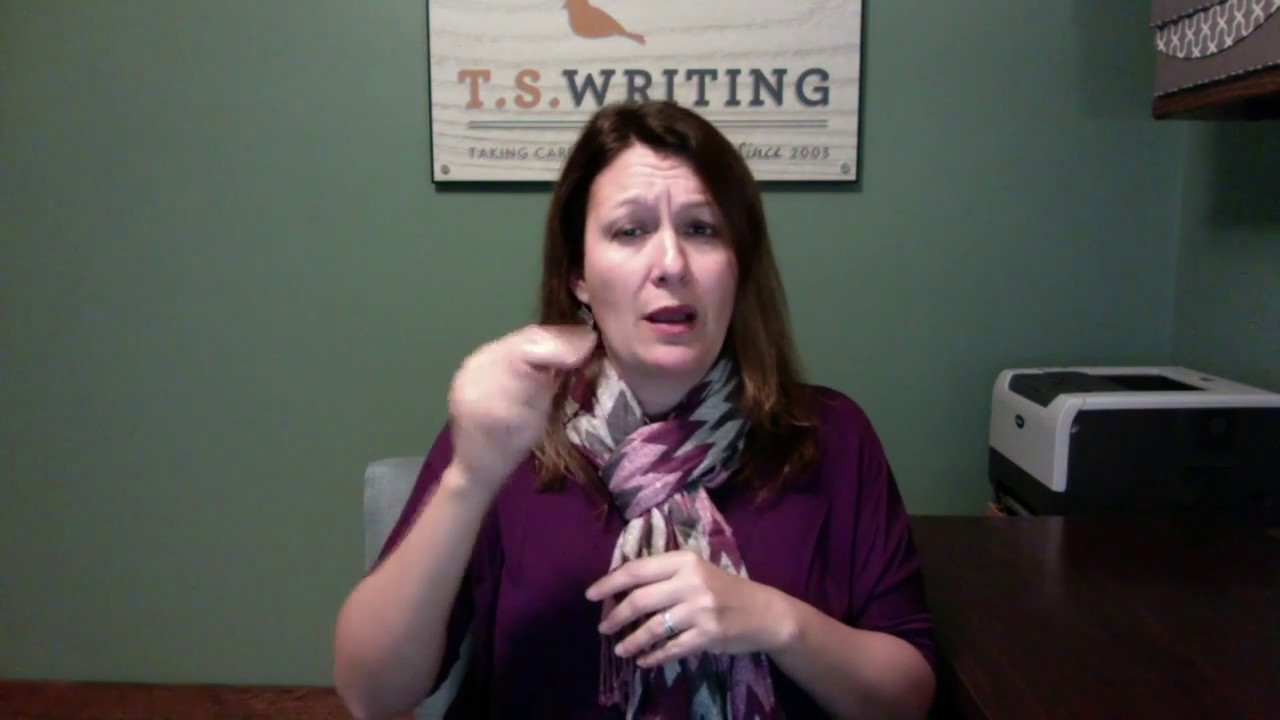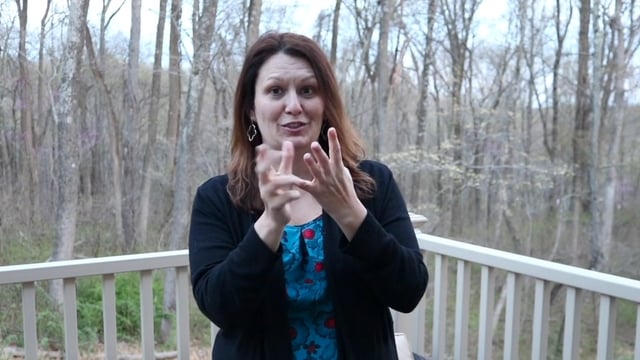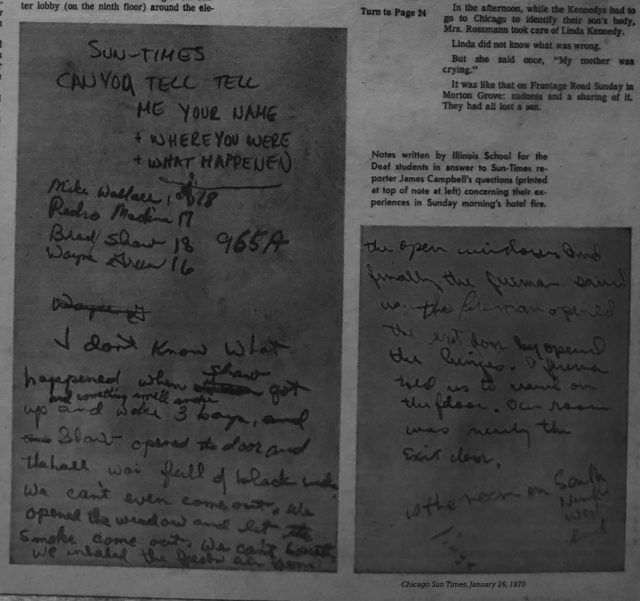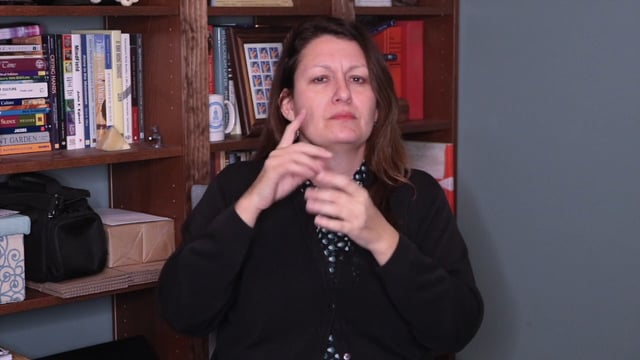This article originally appeared at www.deafprofessional.net.
An exclusive interview with Dr. Glenn Anderson
This is the second installment of a two-part article. The first installment appeared on September 7, 2006.
When Dr. Anderson stepped down as Gallaudet University board chair in November 2005 in order to apply for the university presidency, his interim replacement was Celia May Baldwin, a 1970 Gallaudet graduate. However, facing the wrath and scrutiny of thousands of people infuriated by the presidential search process and selection was too much for Baldwin, who resigned on May 9. “My heart goes out to her,” Dr. Anderson says, noting that their friendship dates back to their days as Gallaudet undergraduates. “She did not deserve to have her tenure as interim chair of the board cut short due to threats and duress related to the search process.”
Baldwin’s replacement was acting board president, Dr. Brenda Jo Brueggemann, who seemed an unusual choice, given her mediocre (or some claim, utter lack of) sign language skills. Yet, in what seems to be a twist of irony, Dr. Brueggemann chairs the American Sign Language (ASL) department at Ohio State University. Dr. Anderson is philosophical about her appointment. “Dr. Brueggemann is in an unenviable position. I doubt she imagined herself suddenly being thrust into position of chair at this point in her tenure of service on the board.” He adds that a new chair will likely be chosen soon; board guidelines dictate that the permanent chair be someone who is fluent in ASL and preferably deaf.
Today, more than a year after President Jordan’s predictable announcement, Dr. Anderson has had time to reflect. Would he have made the same choices as the board had he stayed in his position as chair? His answer may surprise people who think Dr. Anderson was “Gallaudetized”—that is, constantly going along with the university’s status quo.
“Your question calls for speculation and that is always a risky type of venture,” he answers. “Evidently, I would not have been happy with the announcement of the three finalists. I would have expected more and I would not have supported going forward with the three finalists selected by the search committee at the time they did. My preference would have been to ask the board to support requesting the search committee to extend the search. I would have preferred closer adherence to searching for a pool of candidates who possessed the desired qualifications listed in the position announcement—e.g., significant experience in higher education and possessing an earned terminal degree. And at this time in our history, I would also have preferred more intense efforts be made to ensure diversity was adequately reflected among the candidates.”
Throughout all this, Dr. Fernandes has continued to be a chief source of discontent for FSSA, who continued to meet throughout the summer and presented two workshops at the National Association of the Deaf conference. Members of FSSA insist that President Jordan ignored many of their requests and pleas over the years, especially after Dr. Fernandes became provost of the university. Blog after blog states specific examples of how Dr. Fernandes created a great divide among students and faculty and the administration while President Jordan turned a blind eye. Dr. Anderson is hesitant to speculate yet once again. “I believe one has to be on campus on a daily basis to have insight into this. Dr. Jordan’s legacy was already well established as a result of the success of Deaf President Now and his phenomenal achievements during his nearly 18 years as president. However, as he nears the end of his tenure at Gallaudet, it is regretful that the university finds itself mired in divisiveness over the selection of a successor.”
Even so, this division is why Dr. Anderson and 1988-1994 board chair Phil Bravin wrote an open letter to the board last May. Parts of the letter read:
As former chairs of the Gallaudet Board of Trustees, we are looking at the present situation with a heavy heart, knowing how the Board needs to show its resolve and at the same time act in the best interests of the University… (The full letter may be read here [link no longer active]).
In any event, we are leaning towards the position that this is not a deafness or cultural issue, but is emerging as a leadership issue and more importantly, the ability to maintain leadership over time in the next weeks, months and years to come.
The events of the past week and a half has caused great concern on our part of the long term bridges that Gallaudet has to maintain with its constituencies. These bridges have been weakened, and the current state of affairs, if not changed, will cause these bridges to weaken further, and to rebuild these would require more energy and effort that could otherwise be used to make Gallaudet the great University it deserves to be.
…we urge you to do your very best to resolve the current stalemate and reach resolutions that are in the best interests of the University. The time is now to begin a process of healing.
“I believe the message that Phil and I attempted to convey in our letter to the board last May remains timely and relevant today,” Dr. Anderson states. “I would much rather the final months of Jordan’s tenure be a time for reflection and celebration of his long and illustrious career as the university transitions to a new era of presidential leadership.”
Bonded by their Gallaudet ties and love of sports, Dr. Anderson and President Jordan were often seen together at events around the country. Now that Dr. Anderson is no longer a member of the Board of Trustees, he admits he misses the regular interactions he had with President Jordan. “My years of working closely with him on behalf of our alma mater were special and I will always treasure that,” he says thoughtfully. “I know Dr. Jordan is deeply committed to Gallaudet and it is commendable that he plans to continue to serve the university long after he retires. Since we have known each other since our college days, I am not inclined to presume my friendship with Dr. Jordan has been adversely affected by the outcome of the search process. I simply wish the search process had resulted in a more celebratory type of outcome that united rather than divided Gallaudet and its constituencies.”
Dr. Anderson also wants to believe President Jordan’s claim that he had no involvement in the selection of the finalists. “I think the real issue has more to do with what occurred after the three finalists were announced and forums were held on campus. I am aware there has been a persistent barrage of comments, on the Internet for example, in which people wondered about his neutrality,” Dr. Anderson says. “Some feel he was not sufficiently neutral during the search process. Whether he was or not, I do not know. However, these concerns continue to persist and have yet to subside. As a result, I think these concerns are additional factors that contributed to the lack of broad unanimity regarding the search process.”
Today, although still perplexed about the search process, Dr. Anderson is content with his contributions to Gallaudet. “I was pleased to work with Dr. Jordan, the Development Office, the Board of Trustees, the Board of Associates, and numerous Gallaudet stakeholders in support of the first and most successful capital campaign that resulted in over $39 million in contributions.” He adds that another accomplishment was forming a board ad hoc committee that resulted in the development of a board statement on diversity. “I also take pride in the fact that during my tenure, Dr. Jordan gave high priority to recruiting outstanding students and faculty as well as to enhancing and ensuring the attractiveness of the university’s campus as new buildings and renovation projects were undertaken.”
In spite of the developments over the past year, Dr. Anderson continues to be upbeat about what the future holds. “I will remain busy as ever. Most certainly, I will continue my work at the University of Arkansas. We have submitted new federal funding applications and I am excited about the new projects we have proposed,” he says. “I also will continue to serve as vice-chair of the National Council on Disability as well as remain actively involved as a board member with NBDA and the Arkansas Association of the Deaf.” He notes that both he and his wife, Karen, are eager about attending University of Arkansas football games, where their son, Jamaal, is a junior and a starting defensive end. He also looks forward to having more time to spend with their daughter, Danielle and 10-year-old granddaughter Nia, who reside in Virginia.
Optimistic that Gallaudet can heal from this search process, Dr. Anderson is still somewhat cautious. “As Phil and I mentioned in our letter, it will take much hard work, good faith, and give and take from all concerned parties,” he says. “The question is how quickly Gallaudet can heal. That I do not know, but I do hope it happens soon.”
Note: National Black Deaf Advocates was contacted for this article; they did not return our requests. NBDA’s open letters and position papers regarding the presidential search process may be found at their website.
Copyrighted material. This article can not be copied, reproduced, or redistributed without the written consent of the author.




